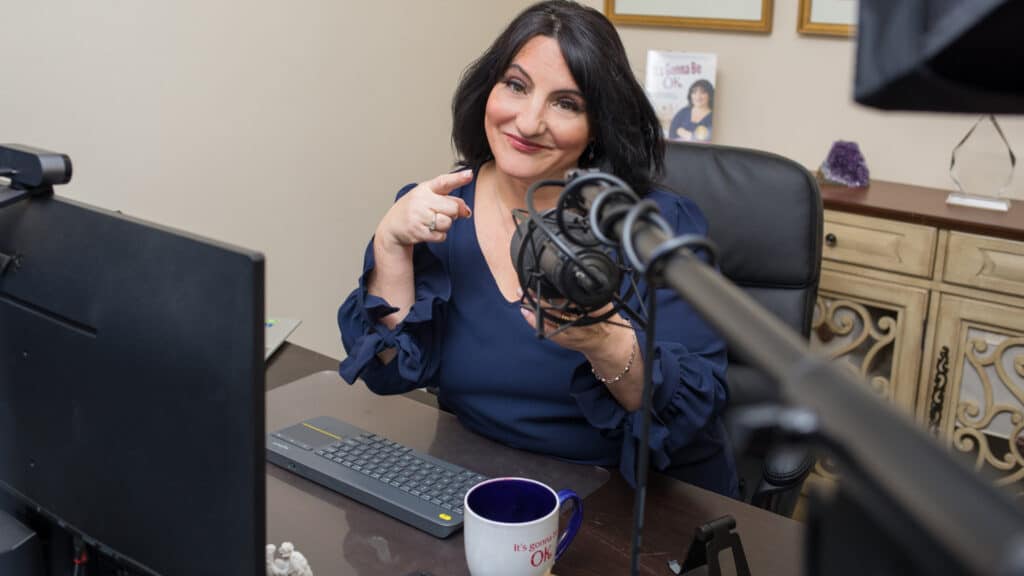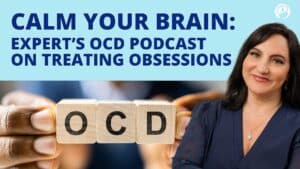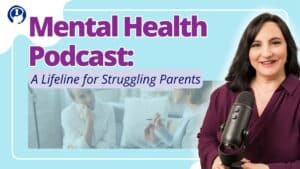Do you want the best for your child? Of course, you do! Did you know that natural treatments can ease anxiety symptoms? Well, many science-backed solutions treat stress and anxiety.
Working in mental health for 30 years using natural treatments to help children with attentional, behavioral, and emotional issues allowed me to help thousands of special needs families worldwide see positive results in their children’s behaviors and symptoms. And how did I do that? With science-backed solutions that are effective, safe, and natural!
You can learn more about solutions for struggling kids and families by listening to my podcasts, grabbing my book, or joining my membership community.
Who doesn’t love a good anxiety podcast?! My podcasts about anxiety are loaded with valuable information for you to get started on the right path to supporting and treating your child who is dealing with stress and anxiety. These are some of the best anxiety podcasts that talk about solutions for struggling kids.
Dr. Roseann’s 5 Best Podcasts for Anxiety
Episode 180: Natural Remedies for Anxiety and Behavioral Challenges in Kids
In this anxiety podcast, I discussed the increasing recognition of holistic therapies and natural remedies for addressing anxiety, depression, and behavioral challenges in children. I highlighted the efficacy of these approaches compared to conventional medications and emphasized their ability to address root causes rather than just symptoms.
Key components of holistic treatments include nutrition, exercise, brain-based tools, and supplementation, all supported by scientific evidence. The importance of discussing holistic therapies with healthcare professionals is stressed, especially for children, and the text provides insights into specific interventions such as magnesium supplementation, physical activity, neurofeedback, and PEMF therapy. The holistic approach aims to empower individuals to take control of their mental health and well-being through sustainable and evidence-based practices.
Episode 165: Supplements for Anxiety: Natural Remedies for a Calmer Mind
In this anxiety podcast, I discussed the increasing recognition of holistic therapies and natural remedies for addressing anxiety, depression, and behavioral challenges in children. I highlighted the efficacy of these approaches compared to conventional medications and emphasized their ability to address root causes rather than just symptoms.
Key components of holistic treatments include nutrition, exercise, brain-based tools, and supplementation, all supported by scientific evidence. The importance of discussing holistic therapies with healthcare professionals is stressed, especially for children, and the text provides insights into specific interventions such as magnesium supplementation, physical activity, neurofeedback, and PEMF therapy. The holistic approach aims to empower individuals to take control of their mental health and well-being through sustainable and evidence-based practices.
Episode 165: Supplements for Anxiety: Natural Remedies for a Calmer Mind
Supplements play a crucial role in replenishing nutrients depleted by stress and supporting a healthy nervous system. Magnesium, particularly magnesium L-threonate and magnesium glycinate, is highlighted for its benefits in promoting brain health and improving sleep quality. L-theanine and GABA are also discussed for their calming effects on neurotransmitter activity.
In this anxiety disorder podcast, I talked about the widespread issue of anxiety, even in children as young as six and emphasized the importance of early recognition and intervention. I discussed natural remedies for anxiety, focusing on evidence-based solutions and the science behind supplements.
Aside from magnesium, essential fatty acids, vitamin D, and B vitamins are identified as key nutrients for mental health and stress management. These supplements, along with adaptogenic herbs like ashwagandha, help the body adapt to stressors and promote balance and resilience.
Episode 122: Magnesium for stress and anxiety with Dr. Ritamarie Loscalzo
Join me as Dr. Ritamarie Loscalzo and I explore the significant role of magnesium in promoting mental health and well-being. Magnesium’s calming effect on the brain is due to the production of GABA, a neurotransmitter known for its calming properties. Dr. RitaMarie is an expert in functional endocrinology, emphasizes the importance of magnesium supplementation, particularly for individuals experiencing chronic stress.
We discussed the prevalence of stress and mental health issues, especially among college students, and the detrimental impact of chronic stress on overall well-being. It underscores the need to activate the parasympathetic nervous system to counter the effects of stress, especially in today's culture, where stress has become pervasive.
Magnesium deficiency is a common issue exacerbated by processed food consumption and lifestyle habits. The benefits of magnesium supplementation are highlighted, including improved sleep, brain function, and stress management, particularly for individuals with ADHD or anxiety.
We also addressed the role of magnesium in managing conditions like ADHD and autism, emphasizing its calming effects and potential to improve behavior and sleep quality in children. However, caution is advised to avoid excessive magnesium intake and potential complications.
Together, we advocated for incorporating magnesium-rich foods and supplements into one's diet to support mental health and overall well-being, emphasizing their affordability and accessibility as a holistic approach to stress relief and relaxation.
Episode 56: School Anxiety and Refusal Strategies
School refusal often stems from anxiety or other mental health issues, and it's crucial to recognize that academic success may not necessarily reflect a child's well-being. Factors like bullying, inappropriate education, and clinical conditions can contribute to school anxiety.
This podcast for anxiety addresses the concerning rise of school refusal among children, particularly exacerbated by the pandemic. I emphasized the need for parents and schools to understand the underlying causes and implement effective interventions to support students and families through this challenge.
To address school refusal, it's essential to delve deeper into the root causes and prioritize mental health. Strategies to feeling calmer, such as breathing exercises and EFT tapping, are discussed, along with the importance of open communication and creating a safe space for children to express their feelings.
Parents are encouraged not to hide information from the school but to seek help from school staff and mental health professionals transparently. Collaborating with the school and trusting the process can lead to effective solutions and support for children struggling with school refusal.
Episode 20: Fasting for Anxiety and Depression with Cynthia Thurlow
Intermittent fasting, a practice dating back to ancient times, involves eating less often and can be as simple as extending the time between dinner and breakfast. It differs from skipping breakfast as it focuses on eating less frequently rather than eliminating meals altogether.
I invited my friend Cynthia Thurlow in this anxiety podcast to explore intermittent fasting and its impact on mental and physical health. We emphasized the importance of understanding how our food intake affects brain health and overall well-being.
We discussed the benefits of intermittent fasting, including improved hormonal balance, metabolic health, and cognitive function. You’ll learn about the importance of autophagy, hormonal regulation, and ketone production during fasting states for brain health and clarity.
Differentiating fasting from caloric restriction, intermittent fasting activates the body’s counter-regulatory mechanisms while promoting hormonal balance. Cynthia suggested starting with a 12-hour fasting window and gradually increasing to longer fasting periods.
The importance of hydration, flexibility in fasting schedules, and incorporating variety in diet and exercise are also discussed. We highlighted the physiological benefits of intermittent fasting for mental health, particularly in reducing anxiety and depression symptoms.
Want more information about solutions for your struggling kid? Learn the ways to combat anxiety in kids by following step-by-step guidance to use powerful natural remedies to squash anxiety. Download the Natural Anxiety Relief Kit and empower your child to rise above anxiety and flourish without relying on medication.
Dr. Roseann is a mental health expert in Anxiety Treatment who frequently is in the media:
- The Happy Student (Podcast) Stress and Anxiety 101.
- The Well (Article) How to Cope With Reemergence Anxiety.
- Parade The 10 Best Heated, Weighted Blankets for a Cozy, Anxiety-Free Night.
Always remember… “Calm Brain, Happy Family™”
Disclaimer: This article is not intended to give health advice and it is recommended to consult with a physician before beginning any new wellness regime. *The effectiveness of diagnosis and treatment vary by patient and condition. Dr. Roseann Capanna-Hodge, LLC does not guarantee certain results.
Are you looking for SOLUTIONS for your struggling child or teen?
Dr. Roseann and her team are all about science-backed solutions, so you are in the right place!
Grab your complimentary copy of
147 Therapist-Endorsed Self-Regulation Strategies for Children: A Practical Guide for Parents
Dr. Roseann is a Children’s Mental Health Expert and Licensed Therapist who has been featured in/on hundreds of media outlets including The Mel Robbins Show, CBS, NBC, PIX11 NYC, Today, FORBES, CNN, The New York Times, The Washington Post, Business Insider, Women’s Day, Healthline, CNET, Parade Magazine and PARENTS. FORBES called her, “A thought leader in children’s mental health.”

She coined the terms, “Re-entry panic syndrome” and “eco-anxiety” and is a frequent contributor to media on mental health.
Dr. Roseann Capanna-Hodge has three decades of experience in working with children, teens and their families with attention-deficit hyperactivity disorder (ADHD), autism, concussion, dyslexia and learning disability, anxiety, Obsessive Compulsive Disorder (OCD), depression and mood disorder, Lyme Disease, and PANS/PANDAS using science-backed natural mental health solutions such as supplements, magnesium, nutrition, QEEG Brain maps, neurofeedback, PEMF, psychotherapy and other non-medication approaches.
She is the author of three bestselling books, It’s Gonna Be OK!: Proven Ways to Improve Your Child's Mental Health, The Teletherapy Toolkit, and Brain Under Attack. Dr. Roseann is known for offering a message of hope through science-endorsed methods that promote a calm brain.
Her trademarked BrainBehaviorResetⓇ Program and It’s Gonna be OK!Ⓡ Podcast has been a cornerstone for thousands of parents facing mental health, behavioral or neurodevelopmental challenges.
She is the founder and director of The Global Institute of Children’s Mental Health, Neurotastic™Brain Formulas and Dr. Roseann Capanna-Hodge, LLC. Dr. Roseann is a Board Certified Neurofeedback (BCN) Practitioner, a Board Member of the Northeast Region Biofeedback Society (NRBS), Certified Integrative Mental Health Professional (CIMHP) and an Amen Clinic Certified Brain Health Coach. She is also a member of The International Lyme Disease and Associated Disease Society (ILADS), The American Psychological Association (APA), Anxiety and Depression Association of America (ADAA) National Association of School Psychologists (NASP), International OCD Foundation (IOCDF).
© Roseann-Capanna-Hodge, LLC 2024










